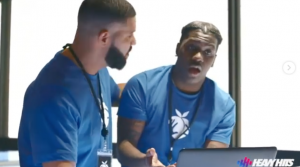
Serato Hints & Tips!
Our amazing Instagram channel (run by the brilliant Schuller) recently shared a superb post, full of useful hints & tips for Serato users!
For our blog readers – here’s what was shared, as well as a few bonus extra tips from the Insta crew!
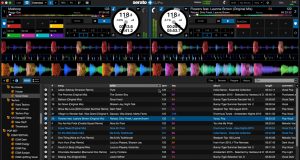
1. When Serato starts playing in reverse press “Q” (left deck) or “A” (right deck) to undo reverse
2. Use “Control or Command + F” to instantly search for a track
3. Accidentally loaded a track to the wrong deck? Press “Control or Command + Z” to undo track load
4. To zoom in/out on the main waveform, press “+” or “-” to zoom in or out
5. To use your iTunes library in Serato, go to Settings>Library>Display and select “Show iTunes Library”
6. To play a track in Serato, press “W” (left deck) or “S” (right deck)
7. Want to keep haters – that are looking over your shoulder – from knowing what song you’re going to play next? Go to Settings>Library>Display and select “Hide track/artist” (DJ AM Mode)
8. To load a track in Serato, press “Shift + left arrow” or “Shift + right arrow” for the left and right decks
9. You can also adjust your brake time in Serato settings to give you a nice tape stop sound effect to spice up your transitions. Go to Settings>DJ Preferences and adjust the “braking” stop time
Then in the replies a couple of knowledge bombs…
From DJ Ric Roc – “T/Y + G/H helps bend tracks forward or backwards. Good to use if ever in internal mode”
Then DJ C Bee dropped this gem – “Cmd + L is the life saver. Takes you back to the song that’s currently playing within your crate”
Give the Instagram a follow for the best hints & tips, memes and news updates!
View this post on Instagram

DJ Etiquette
Etiquette is a word many people associate with stuffy dinner parties and posh restaurants. But every corner of life has some sort of “rules”, best practices to avoid offending or upsetting people, and to make a good impression of yourself. Understanding them can help you avoid looking foolish in front of promoters and fellow DJs, and increase your chances of repeat bookings.
First things first – these are not hard, fixed rules. And there may well be regional differences that I’m not aware of. But, based on my 20+ years of DJing around the world, these guidelines to your behaviour should help you make the right impression! These are based around club bookings – wedding & function DJs, for instance, have a very different set of circumstances to consider.
Turn up on time
I never cease to be amazed by how many DJs cannot turn up on time. We have one of the best jobs going. At any given event there are dozens, maybe hundreds, of people who would like to take our job. Its our hobby – and we are getting paid for it! Why on earth would you be late to that? Something you don’t want to do – sure. But playing music to people for money? What is making you want to miss the beginning of that?
Being late is going to annoy the people who booked you, and possibly the DJ you are replacing on the decks, if they’ve got somewhere they need to get to. Busy DJs often have multiple sets in one night, and might need to keep a very strict timetable – if you are holding them up from getting to their next gig, you’ve annoyed your booker, that DJ, and then they will go to the next venue and blame you for why they are late!
To compound things, a lot of DJs think – “Ah, I’m supposed to be on at 10pm. It’s 10.10pm. I’d better text them to tell them I’m running late”. Errrrr… I think its safe to say that this isn’t especially helpful. If you think you might be running late, let them know as soon as you realise it is a possibility. Give them plenty of warning so they can tell the DJ that is on (they can then pace their set appropriately, or make arrangements if they are in a rush to get a subsequent gig), and then if you manage to turn up on time you’ve flipped it, so it seems like a positive that you’ve done the single easiest thing in the entire universe.
Check out the end of the DJ’s set before you
Even better than simply turning up on time is to to turn up a little bit of time before your set starts. This gives you the chance to say hello to the DJ on before you if you are taking over, or time to make sure the DJ booth is set up right for when you start (NEVER assume that everything will be perfect when you arrive!). Have a walk around the venue. Listen to the sound, any louder or quieter areas, check out the clientele, try to get a sense of what they will be into.
If there is a DJ already on ahead of you, notice what they are playing. If they are up for it, you could even ask to look at their play history. It is amazing how many times I’ve had a DJ turn up a minute or two before they are due on, hurriedly put a USB in, and proceed to open with a song I played about 5 minutes before. Sure, that opening song does go great with my last song… that’s kind of how this song came to be on… And I will admit to having done the same myself; quickly got a song playing, only to have the DJ say “Oh, I just played this”, with lots of confused looks from the dancefloor. VERY embarrassing.

Ask how they want to do the changeover
So you’re in the booth, the DJ before you is killing it, and your set time is approaching. Generally there’s a “one or two more?” conversation a few minutes before. When it gets to their last song – its not a bad idea to ask if they want you to let the song play out a bit, as DJs often make their last song something a bit special which they think deserves hearing in full.
This etiquette cuts both ways. If you are scheduled to finish at 1am, don’t stick an epic 9-minute remix on at 12.59am and demand they play it in full!
Depending on the situation, you might want to fade the music down or let the song play out, and then lead a bit of applause for the DJ before you, then start your set from that point. This used to be pretty unusual, but with the advent of DJing on stages more, and DJs having greater celebrity status, this is now quite common. DJ sets are almost like band sets – they have a very defined beginning and end, and sometimes bear little relation to what came before or comes after.
In some situations it might be better to smoothly mix out of their last song, especially if you are mixing house or techno. Keeping the groove going is far more important in those kinds of situations than at many other parties. Also – this can sometimes lead to impromptu back-to-backs, which can be great fun, and if you are an up-and-coming DJ, playing back-to-back with a big name is a great experience, and can generate some fantastic social media content!
If the headline DJ is there with a fair bit of time before they are on, it might be worth asking “do you have any tempo you want me to leave it at for when you take over?” Generally, I find that DJs just say “do your thing!” and encourage me to express myself without worrying about teeing them up, but it shows consideration to do this, and sometimes they might have a preference.
Understand your role
Are you the warm up DJ? Are you the headline set? What is the promoter or venue looking for from you? What sort of crowd has come along tonight? When does the night normally peak? How much of the event is left after you finish your set?
There’s a whole heap of questions you should try to know the answers of when you get on the decks. That’s not to say that you should bombard whoever booked you with all of them directly – which could risk making you look nervous or amateurish. A few key questions here and there is fine, but it is often better to try and get the answers you seek in a more oblique way, either from observation, from asking open-ended questions, or from looking things up online ahead of time.
If you are the warm up, play the appropriate style set – and the key here is to understand what the party and the person paying you wants. Some places want you to do the traditional “slow and steady, build the atmosphere” type sets. Other events, they want it high octane from the moment the doors open. If there is a big producer/DJ on after you – don’t run through their tracks and remixes!
Is your job actually more about soundtracking a vibe, rather than getting the place hype? Smashing out massive festival bangers at a restaurant gig might not be the best approach!
Look the part
I can understand the mindset that it should solely be about the music you play. I used to fully subscribe to it. But the reality is that presentation matters. At some gigs, having a DJ on is an aesthetic choice as much as it is about the music you play – think of sets at malls/shops, restaurants, fashion shows.
By all means, interpret this your own way. Different scenes and different regions will have their own styles to reflect. There’s a balancing act to be found between standing out and fitting into the look of wherever you are. When I do corporate and private shows, I make sure to find out if its a smart or casual affair. I then pick an outfit out that fits that – but make sure that it is distinctive enough that when I walk in, the event organiser can probably work out that I’m the DJ! Ultimately, we DJs are performers. Embracing that side of things makes total sense. Use your own judgement though – some underground scenes can be a bit snobby about people dressing in ways outside the norm! Good luck finding any men in a techno gig DJ booth that aren’t in a baggy black t-shirt!
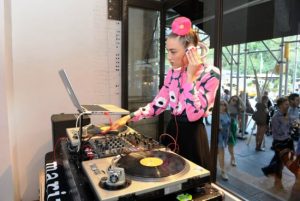
Be friendly, be helpful
A smile and helping someone can go a long way. DJing is actually sometimes a surprisingly solitary endeavour – all those people out having a party, and the DJ there, but separate, their head necessarily in a different space. Striking up a good rapport with other DJs is a great way to help with that, and then when you bump into each other in another city there’s a kind of “old buddies” camaraderie you develop with DJs you’ve played with before, even if you’ve actually not spoken to each other that much.
If you want to make positive memories, one incredibly handy thing I once did, and which I now just do as routine… headphone adaptors. For some reason, DJs are forever losing them. It is crazy really, but its definitely a thing. Well, you can buy them for almost nothing on Amazon – maybe a buck or two. Certainly a lot cheaper than a drink. Every so often I buy a load, and then by the end of the year I’ve saved a load of DJs necks. They are eternally grateful, I’ve helped out the night and the other DJ, and everyone thinks I’m a total hero. Sounds insane, but there you go!
But as a general point – see other DJs as your colleagues, not your rivals. You are on the same team, and the goal is to give the audience a good night. Achieve that, and your career will look after itself.
Be VERY wary of loose trash talk, even if you think another DJ sucks. For a start, you never know who they are friends with in the club, and you might end up saying the wrong thing to the wrong person, and losing a connect. I love this old joke – “How many DJs does it take to change a lightbulb? 10 – 1 to change it, 9 to stand around saying they would have changed it better.” We have a reputation for thinking we are great and nobody can do it like we can… Do you really want to live up to a negative stereotype?
Equipment
Don’t leave this to chance. Don’t make assumptions. Find out what they have, and let them know what you prefer to use. It may or may not be possible for your preference to be set up – if that is the case, make yourself familiar with what you will have waiting for you (YouTube will be full of info about any unfamiliar equipment). If you want to bring a controller to plug in, run that by the club – first off, they might simply not want you to (as most people tend to just stick the controller on top of a Nexus set up worth $6000-7000). Using thousands of pounds worth of delicate DJ equipment as a table is not ideal… So, maybe they can make space, maybe they can arrange to have stuff moved for during your set.
If your preference is to use vinyl and Serato, they need to know. Likewise if you prefer CDJs and don’t bring needles/serato vinyl, let the venue know ahead of time – I’ve had that happen before, turned up to a gig and they had assumed that because I scratch I would want Technics installed!
And treat the equipment as if it is your own. For god’s sake don’t put drinks on them, and don’t wave drinks around over them! Accidents can and will happen, and it is very easy to simply avoid creating the situations where they are most likely.
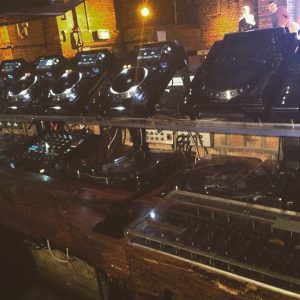
Guest list
This can be a weirdly awkward thing. It is customary for a DJ to get a few guest list spots, and maybe even some drinks tokens for their guests. But it is a good idea to clear up exactly what the deal is when you confirm the booking. Bigger venues DEFINITELY appreciate having the guest list confirmed well in advance – when I was resident at Ministry of Sound, they asked for all guest list names for Saturday night to arrive by 5pm Friday, so that the office could process the requests. Sometimes I could get late people on the list – sometimes I couldn’t, it depended on the circumstances.
If you are on an early set, the promoter may well be happy for you to have 40 people free on the guest list, if it means a busy dancefloor from the moment the doors open. Its more likely that they will offer you some free, and some on a discounted paying list.
Find out the protocol to get in on the guest list – relay that information to your guests. Make sure any mates who aren’t on the guest list understand that they aren’t, as it is not a good look to have a load of people arguing at the front door with security and club staff, your name on their lips!
If your friends are joining you in the booth, make sure they are respectful of the space, and anybody else in the DJ booth. In particular, make sure they understand not to wave drinks around the equipment, touch any of the kit, and let the DJ do their thing!
Drinks
Similar to guest list, this minor detail can get tricky if you aren’t on top of it. Find out if you get a drinks rider, and if so what it is – some places will give you tokens, other places a tab of a certain amount over the bar. If the latter, be careful – they might not cap it when you reach your limit, and then you end up getting a bill at the end of the night. Being drunk, then surprised with a bill for drinks after you’ve just been performing can create some awkward stand-offs, I’ve seen them get pretty heated!
It might be that you get your drinks brought to you in the booth in an ice bucket – maybe vodka and mixers, or a load of beer bottles. This is great – until random people start drinking your drinks. Annoying right? Well, imagine that you turn up and you or your guests start drinking the other DJ’s booze. Great way to make a bad impression!
All this free booze though, fantastic! Well – yeah, kinda. But having a litre of vodka in the booth carries some pretty obvious risks! I’ve got into some terrible states in the DJ booth. Usually its been fine – maybe my mixing was a bit sloppy, I looked a bit dishevelled, but nothing too bad happened. Other times… yikes! The low point would be that time when I literally put my headphones down at the peak time of a set and staggered out of the DJ booth, out the fire escape, and somehow made my way home. To this day I have no memory of any of that!

Don’t add to the problem pile
I like to think that most of the above is pretty common sense stuff really. I’ve broken many of the “rules’ I have talked about above, and seen most of them broken every month, every year of my career. One thing won’t end your life as a DJ – but you can really help yourself by being easy to work with, and a pleasure to be around.
Ultimately, much of it boils down to good, clear communication. Getting details worked out before the music is deafening and the lights are flashing! And in my experience, being reliable, professional, friendly and competent goes a really long way.
Every job exists to solve a problem. The more complex and responsible a job, the more problems they have to solve. When a venue books a DJ, they are solving the problem of entertainment. They want someone to come in there, play music, and entertain their clientele. DON’T ADD TO THE PROBLEM PILE!
If you show up to play your set and immediately start throwing your weight around and making more problems for the promoter, the manager, the owner, the other DJS… thats not going to fly unless your name is worth a lot of ticket sales!
You want to show up, do your thing to the best of your ability, make friends with the people you cross paths with, establish a rapport with the people who booked you, and the audience on the night.
Do the right things and be a bad-ass DJ, and you have a decent chance of making progress when we properly get back to clubbing. While we are waiting for normality to return, go get the hottest tracks over at the Heavy Hits Pool, and follow me over on Instagram.

The Ups And Downs Of Running Your Own Events
We’ve spoken with Rob Pursey on these pages before, in an interview covering his career to date. A huge part of that career is built on his choice to run his own events – something that can be a huge benefit to DJs, but which many are nervous to attempt.
I linked up with him to get some pointers on the ups and downs of running his own parties!
How did you first get into running your own events?
It very much happened by accident. I’d been a part of events as a DJ and been involved to a certain extent, but had always taken a more back seat role. We then started our music blog Southern Hospitality and a lot of our events grew out of that and the desire to play music that wasn’t being represented in London clubs at the time. It’s hard to imagine a Hip Hop/R&B club scene that doesn’t play majority ATL rap etc now – but back then we were the only people doing it.
You run multiple club nights – how do you go about balancing those? Are you careful to keep them stylistically separate and spread across various venues, or do things overlap?
Yes that’s crucial and something I’m super conscious about and make a point of trying to match the club event to the venue. For example an event like Players Ball needs that low underground, communal atmosphere it can’t be a table-service affair because we need people to wile out and have fun! Then other events like Rated R, which is an R&B event can be a little more chilled for most of the night and to use an old school phrase can stay ‘bubblin’ for longer, as it’s more about just enjoying the full tunes and not running through records so fast. Hip Hop Karaoke is kind of where everything overlaps, because as well as the performers we have a club night built around it and depending on the crowd that can be an impromptu Players Ball style session, or a more throwback affair – that’s definitely more of a call on the night!
DJing is a pretty precarious job in itself, but running nights takes the risk/reward equation to the next level – what advice do you have for people starting out with events? How do you manage the stresses of risking money – I found it hard to deal with the reality of putting events on that ended up losing money or barely breaking even! And when things are going well, are there things people can do to avoid getting carried away?
Without sounding boring, it really is a case of not getting too gassed. You sell out a few events and make good money and it’s easy to think it will just roll like that forever, but without attention to detail it won’t. I think to start with just put something on that you fully believe in and have a passion for, because that will be communicated to the customer and will more likely encourage loyalty to your event. Losing money can definitely be avoided if you don’t overstretch yourself and just be real about what you’re trying to achieve and slow growth is still growth! The stress is definitely always there in the run up to events, especially ones that aren’t looking as promising as others, but if you just channel that into some sort of action – extra promo – then generally it both de-stresses and adds on to the event itself.
For a typical club event you put on, how many people are involved – from promotion through to the actual night? If it varies, what are the benefits and drawbacks either way?
I run a pretty small team for my events and for larger events bring more people in. On a typical club night it will be myself and a couple of others on the promo, a designer (who does the majority of my artwork) and then door staff and occasionally some street promo staff. The benefits of a small team are obviously larger dividends when the night goes well, but equally I’ve been slightly burnt by cutting a corner and realised I could have made a bit more money or had a busier event with a little help. So it really is a balance.
How important these days is traditional, old fashioned promotion like posters, flyers and word of mouth vs the use of social media?
I think word of mouth is still greater than everything. If people have a banging night, they will come back and bring people. I feel like posters, flyers etc are definitely outdated however when used on the night they can definitely scoop up a few extra people and sometimes just having that visual presence on the streets does sink in subconsciously with people. However in saying all of that, it’s definitely largely social media these days.

How did you end up getting your brand Hip Hop Karaoke on to the festival circuit? Was that something you pursued, or did festivals come to you?
Festivals came to us initially and then it’s really just rolled on from there. We now have good relationships with a lot of the larger festivals and return each year as well as making an effort to play new festivals that arrive. It wasn’t even something I thought about originally but once we did a few it quickly became the favourite part of my job.
One of the common issues for successful promoters is people biting their ideas – you’ve been ahead of the curve on a few things, so how did you react to others following your ideas?
Yeah I’ve definitely been bitten more than a few times ha ha! I won’t mention any names, but I just have to mentally keep it moving and just try and do my event/s to the best of my ability otherwise you end up chasing negative energy. I definitely try my very best not to do it myself however, even unwittingly as I feel we have to respect each other out here. Generally the original promoters last longer and the biters make a quick buck but don’t know where to go next after that one runs its course.
How important are things like the name and artwork of a night?
Crucial. A good name of an event at the right time can really capture the imagination and mood of people and seem like the essential place to go. Equally with the artwork, it has to signify something to the audience you’re trying to attract, whether that’s a key artist, or some sort of design texture. It needs to be authentic.

How do you go about building up and sustaining a following and community around a club night?
Pretty much as I mentioned before, by paying attention to how the night is going and making sure the musical programming isn’t predictable and generic. I also make an effort to be at the door and amongst the people at my events and build relationships with my crowd old school style. People then begin to trust you when you launch new events. It’s not contrived however as that’s just how I am – I like people! The community part is super important to me and if you have that then you’re halfway there to putting on great events as your crowd will do the promotion for you.
If you could go back in time and give yourself one piece of advice before you started putting parties on, what would it be?
I would definitely train people up to run an event in my own image then I could take a few more nights off! Team is everything and I definitely left a lot to chance in the early days and just gave myself too many jobs!
What did you do during lockdown to maintain your events and brands and keep connected with your communities?
With Hip Hop Karaoke we did ‘Quaraoke‘ which was so much fun and I actually found we got people who couldn’t always get to the events performing online which was super satisfying. Also just posting stuff of relevance and keeping the aesthetic and energy of the events online as much as possible.
What have you got going on at the moment, and the coming months?
Well, as things are (slowly) changing, we’re gearing up for our first post quarantine events, which may be a slightly pared down version, but will be great to get back nonetheless! In the meantime I’ve been keeping my hand in by doing some sets online and some at larger open spaces like Boxpark Croydon, so I’m not totally rusty!

What’s The First Track On Deck When We Bars & Clubs Open Back Up?
The brilliant Heavy Hits instagram channel asked our community this question, and we got a great selection of replies from the DJs there!
Its a question that a lot of us have been asking ourselves, and so here’s the highlights from the post, to spark some ideas for your sets!
DJ edit legend Isaac Jordan was quick off the draw with a brilliant suggestion – Scarface and Jay-Z – Guess Who’s Back.
Former interviewee DJ Gravity One took a cheeky look at it with his suggestion Deborah Cox – Nobody’s Supposed To Be Here! Not exactly a club banger, but might be suitable for some of the illegal raves happening right now!
DJ J Sizzle went for a classic with the right sentiment – Ma$e – Welcome Back. While DJ King JB focused on what we’ll be leaving behind, with Future – Mask Off!
No messing from DJ Raize – he is all about that new heat, WAP!
While DJ AndOne goes in slick and smooth, suggesting T-Pain – Buy U A Drank
My choice – its a new-ish song, with an old skool feel, DJ Format & Abdominal – We’re Back.
View this post on Instagram
Follow the Heavy Hits insta to keep up with all the best memes and DJ conversations, and head over to the Heavy Hits pool to snag the tracks you need to be ready for when you are back playing to dancefloors!
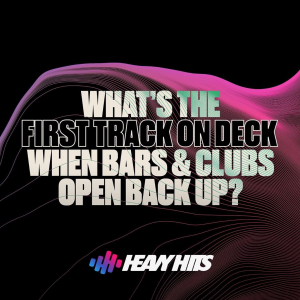
How to deal with requesters!
If there is one thing that unites DJs, it is that we have all, at some point, had to deal with super-drunk people asking for songs. How we handle these moments can really change the way we experience a night, and so it is a good idea to have some strategies and techniques for dealing with them.
Of course, there is no right way, and no wrong way, of handling this. Its a personal choice, and often depends a lot on the sort of party you are spinning at, the sort of crowd, and a million other variables.
But, with that said, he are some ideas that I have settled on from over 2 decades of DJing all over the world, from clubs like Ministry of Sound and fabric, through to weddings and corporate Christmas parties! Hopefully they will help some of you when this pandemic is finally over, and everyone is back to partying every weekend!
ALWAYS BE POLITE
No matter what, try to keep your cool. Drunk people will often say things in a very blunt way, often not realising that they have accidentally insulted you. Or they might be insulting you very deliberately. That doesn’t matter – ALWAYS keep the moral high ground, always stay calm, do not get angry, do not get into an argument. There is zero benefit to you if you do this, and if you let it get personal, you massively increase the chances that they will complain to management or leave a bad review of a venue.
Of course, this is easier said than done. Drunk customers screaming in your ear while you try to mix can be extremely annoying.
If you can, try to create simple, firm boundaries – politely let them know that you’ll be with them once you’ve done the mix you’re in (I generally hold a “with you in 1 minute” finger gesture up – no, not that finger gesture…). What is hilarious here is how often they get bored within maybe 20-30 seconds and just wander off back to their friends, usually just as I’m finishing up my mix. Don’t let them come into the DJ booth. Definitely don’t let them hold drinks ANYWHERE near the decks, and especially not in the airspace over them – drunk people spill drinks ALL THE TIME! If you can make sure a member of the security team is by the DJ booth to act as a firewall, even better!

HAVE FUN WITH IT
There’s a suite of standard DJ requests that every long-time DJ has heard a million times. Some of these used to really get under my skin. But over time, I’ve learnt that it is far better to have a bit of fun in those moments.
When people say “Can you put something good on?”, a lot of the time they have no idea that they are implicitly saying “because this music isn’t good”. My standard response to that request is this – “I’m afraid not, I’m not allowed to put anything good on. Orders of the management. Only allowed to play really terrible songs, its the house rules. Honestly, it would make my life so much easier if I could put good songs on, but I’m just not able to”. About 80% of people get the joke, and realise how rude they’ve been, and we have a laugh, and its all good. The other 20% are OUTRAGED at this crazy policy, and it is genuinely hilarious to have a conversation with someone that stupid about a concept so ridiculous.
When they as “Can you put on something we can dance to?”, I have a great line I picked up from another DJ friend,- “you start dancing, I’ll mix something in to your dancing”. Usually gets a laugh. I used to point out that if they want to dance to whatever is on, they can, but this line of conversation never got me very far, so I don’t tend to do that now.
When you’ve been playing out for a while, you get to know what are the things that people will say to you a lot, and you can work out the best responses for you and the crowds you play to. And remember – the crowd are your friends, you aren’t trying to be mean, you want to have a laugh with them, not get into a confrontation! They just want a fun night, and you want them to have a fun night – but drunk people in clubs aren’t always the best at expressing themselves!
THE BLANKET YES/NO
These two options are quite popular. The blanket no is a bold strategy, and isn’t something I would tend to advocate for in most situations. Sure – if you are Carl Cox, and people have come to see you specifically, paid $50 a ticket to see what you are going to play, then I think its reasonable that you aren’t expected to field requests. But if you are just the DJ who happens to be on in that venue on that night, and the crowd in there is coming in to the venue (rather than specifically to see you DJ), I would generally say that at least listening to requests goes with the job. Obviously, lots of people have differing views on this, and it all depends on the context.
But with a blanket no, it is very straightforward – no requests, just play what you want, when you want. Some people put signs up or wear ostentatious t-shirts to make the point, but chances are that you’ll still get people trying it on. You just have to stick to your guns and hope that the choices you make keep them happy!
The blanket yes is a lot more sneaky! Basically, they ask for whatever they ask for. You say yes. They go away, you play it or not, whatever, its as if the request never happened. I’d guess that 90% of those requesters never come back to the booth. And old co-host of mine used to swear by this approach (RIP DJ Remy), and always used it. I sometimes say yes to requests, then simply forget to play them – then realise that they never came back to complain. So, it does work.
The big risk here is that you give a yes to something you don’t have or would never play, and they keep coming back persistently – at a certain point you might have to switch that yes to a no, and then deal with the fall-out!
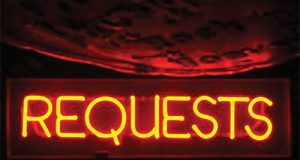
KNOW YOUR ROLE
I’ve alluded to this already. There’s all sorts of DJs, and all sorts of parties. At a cool underground party, or one where you are the special guest that they’ve flown in, specifically to hear YOUR style of DJing – requests are much less of a thing. Chances are you’ll still get a few, but there is much less expectation to play them.
At a wedding? An office party? A late bar drinking/dancing spot on a Friday night with a really mixed, commercial crowd? All of these places and more will be full of people expecting to hear the hot songs from the radio, the classics from their youth, etc etc. In my opinion, it is just part of the job to handle requests at these sorts of gigs, and do so with good grace and humour.
I personally am happy to listen to requests. If its a good song, and fits the party, I’ll say “yes, I’ll try and work it in”, and add the track to my Serato prepare crate. Often a “yes” will be followed with a hopeful “play it next!” – I draw the line at people dictating when and how I mix through styles and genres! I like to play all sorts of music, but I want my sets to make musical sense – so a yes to a request might still mean that they wait for a couple of hours to hear the song.
PRIVATE FUNCTION? DO YOUR HOMEWORK!
One of the best tricks I have learnt for wedding sets is a deceptively simple, and surprisingly important, one. I speak with the bride and groom in advance, and try to get a “Definitely play” and a Definitely do not play” list – with the latter one being the one I emphasise. Usually couples haven’t even considered this, but some songs have painful memories attached, or might be associated with a previous partner. They might have a certain singer who’s voice they hate, or a genre that makes their skin crawl. On their big wedding night, you want to avoid nasty surprises like that!
If I can, I like to get at least 15-20 songs that they REALLY want to hear (and if choices are maybe not very “party” I will double check with them – most couples just want that you make the dance a fun night, and play music they enjoy!), and build the set around that on the night. It gives you a great idea of how to structure things, what will make them happy, and so on.
The “Do not play” list has the benefits outlined above – but also stands you in good stead when the drunk uncle comes over saying “you know what would really set this party off….” and asks for something that you know the happy couple would hate!
Similarly – if you are going to play at a corporate party, try and find out if there are any songs that absolutely mustn’t be played (All hell broke loose when I played a request of Blurred Lines at the Xmas party of one of the big tech firms, and every subsequent party I was instructed in the contract to not play that one song!). Try and find out if they have any tunes which are big for the company, kind of inside jokes or anthems from previous parties – little things like that creating special moments will do wonders for repeat bookings!
For all private functions – check in advance if they want you to play clean versions of songs!
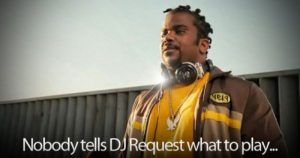
CREATE A HURDLE
If you don’t really want to have to speak to requesters all night, one trick you could try is to make it a bit more difficult.
For example – one thing I have seen is a sign explaining “For requests please do an Instagram story, tag DJ @XXXXX and club @YYYYY, and enter your request on the story”. The club and DJ get a bit of social media content, and most people will simply not be bothered enough to jump through those hoops.
If you are feeling really cheeky (and organised!), maybe set up a premium text service and charge people to text in their requests!
MAKE IT SIMPLE
Or go the other way – get a pen and pad, and let people write their requests down. Upside – you don’t have to talk directly to people, and generally they will wander off after they’ve written their request and waved it around a bit. Downside – party people don’t often write very neatly, and the drunker they get, the bigger and messier the writing gets, until eventually you’ll be lucky to even get one request per page.
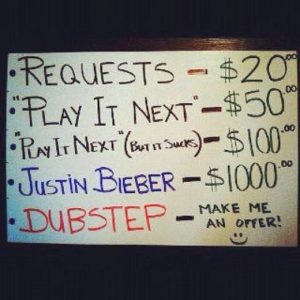
THE “SKIP THIS SONG” PEOPLE
These ones are the worst – and a pretty recent phenomenon. Generally, they stand in the middle of the dancefloor making that sort of throat-slash/cut gesture, or the rolling-hands substitute sign, staring straight at the DJ. Honestly – I think this one is just amazingly narcissistic. I’m usually play long sets, covering dozens of genres and eras. No person in the building is likely to be into every single song I play, and that’s fine! But the idea that “I don’t like this one, skip it!” is an acceptable response while others are having a good time… sheesh…
My response is generally quite petty, but whatever – I basically take my headphones off and make a real show of stepping to the back of the booth, or the edge and chat to a friend, and let that song play to the very, very end. If they’ve done the hand-roll gesture I sometimes pretend to think they mean “play it to the end” and mime the words back with the same hand gesture “play it to the end, sure!” A DJ’s job is literally to put the next song on, and these days most open format DJs rattle through songs rapid-fire. So this one is a particularly stupid form of request, and deserves to be treated as such!
SHAPE YOUR MINDSET
Its very easy to get negative about requests – they can be annoying sometimes! But you have it in your power to flip anything into a positive. If you are getting a steady stream of requesters all night, that means you have plenty of customers in the venue. It means you have a way of hearing about songs you might not have checked out otherwise (even if they turn out to be rubbish!). It means you have endless opportunities to create a good rapport with regulars – which will help you solidify residencies. It means you have a chance to practice your patience with the more difficult ones…. Basically – you’re going to get people coming and talking to you when you DJ, thats a fact of life, so flipping your perspective to think about it positively is a very sensible approach to take.
Its very easy to forget – at a party, the DJ leads. You have to be sensitive to what the crowd wants, but you shouldn’t be following them, they should be coming with you. Often there is a particular type of person who comes and make requests, and often they aren’t the most polite. They’re just the loudest, the one prepared to go and demand what they want. Never feel like you have to change the party just because a handful of loud people are hectoring you – look at the bigger picture. Is the dancefloor full, is the venue busy, are people smiling and having a good time? I’ve been told SO MANY TIMES that I need to change the music, nobody likes what I’m playing, and its like I’m in a parallel universe to these people – I just point at the hundreds of happy people having a great time and make the point “I’m not sure that’s true”
SOMETIMES ITS OK TO BE BLUNT
Occasionally someone just doesn’t get the message. I always try to avoid getting angry with people, or swearing, or anything else like that. But sometimes, you just have to say it like it is, and even then you can dress it up a bit – “Look – I play here every Saturday, and they pay me pretty well. I’m definitely in the right place, they like what I do. Maybe you aren’t in the right place?”, which effectively translates as “I think you should leave”
Sometimes people annoy me to the point where I explain that any song they request I will deliberately not play, even if I was going to before they mentioned it. With incessant requesters, I sometimes stop them and say “OK – this is the last request you can make tonight, after that just enjoy the music with your friends!”

IN CONCLUSION
I’m sure there will be some who disagree with things I’ve written above – these are just my opinions, and some things that work for me. And there isn’t a “correct” way to do this.
You get better at it with experience – I struggled early in my career, and young DJs I’ve mentored have often said that they struggle with requesters, and that it can knock their confidence at times.
There is something lovely about being able to completely make someone’s night simply by putting a song on for them. I’ve had times where I’ve said no to a request, then realised I actually have the song – the look on those peoples’ faces when they recognise their song coming on is so heart-warming! And there are moments of genius from customers occasionally – where you just think “that is brilliant, and perfect!” and put it straight on! And I absolutely love it when people make a request and I can silently point at my screen, because the track they are asking for was already loaded up to come on next, through some psychic connection!
Try to do everything with a smile on your face. If someone says something stupid or rude, don’t let it get you down – make a mental note of it, and you’ve got some fresh content for your social media – I find that people love funny DJ booth stories about this sort of stuff!
But for now, head over to the Heavy Hits pool to load up on the best new music, and check out my Instagram!

Protect Your Ears!
One of the most important things for any working DJ is to protect their hearing, but it is amazing just how many DJs don’t make any attempt at all to do so. This is especially strange when you realise that tinnitus is irreversible – once you damage your hearing, you are stuck with the damage forever (or until some futuristic treatment is invented!).
There are various ways to look after your hearing, at various costs.
One of the best decisions I ever took was to be a pretty early adopter of moulded ear plugs – I got my first set nearly 20 years ago, and in terms of value for money, they were a bargain. The price varies somewhat, but in the UK I have generally paid roughly £125-150 for a pair of moulded earplugs, including the chosen filter. For the kind I got, I found this in the USA – coming in at $185.
The procedure is fairly straightforward, and to my mind, quite a pleasant experience. The ear specialist takes a putty mixture and syringes it straight into your ears, with small piece of foam attached to a piece of string already in there, creating a perfect mould of your inner ear canal, which they can pull out using the string once it sets.

These are sent off to be turned into earplugs of whatever colour you choose – pro tip, pick a colour that you can find easily in a dark DJ booth if you put them down! I usually go for a bright yellow, and they have all sorts of options on a menu. You can also have your name written on the ear plugs, which is handy if you lose things!
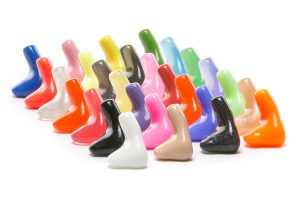
They come with filters of varying strength – I’ve generally favoured 15db filters, as they take enough off to protect my ears, but not so much that it totally kills the experience. But sometimes in certain clubs/festivals you might want more protection, and sometimes at quieter gigs, 15db can be too much. So it can be useful to have different options if your budget stretches to that, and in many moulded ear plugs, the filters can be popped out and swapped around. Watch out for losing them though, as the actual filters are tiny! The main selling point of these is that the volume goes down, but the sound stays broadly the same, as they cut a very even range of frequencies out.
A huge benefit that I have noticed from using ear plugs, beyond the obvious reduction in volume, is the physical protection from people shouting in your ears. This is something most DJs have encountered plenty – drunk patron, or a friend, comes over to say something, leans in, then….. SCREAMS directly into your ear, which is can be genuinely painful, and incredibly harmful to your ears too. The earplugs above act as a physical barrier for the air pressure problem caused by that situation. I also find that it seems easier to have conversations in clubs etc when these are in – so much so that I tend to wear them to gigs, festivals, clubs etc.
I will not lie to you – it is more fun to DJ without them in. It takes a little while to get used to the change, and a first you might find it a bit unsettling, and not be sure about your EQing and volumes. You definitely have to watch out for turning the main speakers and monitor loads louder – cancelling out the benefit of the earplugs, and absolutely ruining the ears of everyone else in the booth or venue! Every so often take the earplugs out and check how things sound while you get used to playing with them in.
But the benefits are huge – you protect your hearing! No more EEEEEEEEEEeeeeeeeee…… whistling noise in your ears when you get back home from a gig! Tinnitus is no joke – my friend Eddy Temple-Morris recommended the place I got my plugs from, and also is an ambassador for a suicide prevention charity. Those two things are more linked than you would expect – plenty of people with bad tinnitus become suicidal, so take this stuff seriously! I highly recommend you Google your local ear specialist and get yourself properly protected. If you are in the UK – check out the Musicians Hearing Health Scheme – an incredible discount on top of the range hearing protection, plus a hearing test.
Cheaper Options
While I would definitely recommend you get the moulded earplugs, and would say that they are the best value for money you will ever spend as a DJ, if you simply can’t afford that, there are cheaper alternatives.
At the very basic level, there are those little foam ones – incredibly cheap, a quick look on Amazon and you can get 60 pairs for $11.99! There’s all sorts of colours and brands. Be aware – while these will reduce the volume somewhat, and provide the physical barrier for shouty people screaming in your ears, these are designed simply to block sound out – maybe for workers, or people trying to sleep better. They are not attenuated to be able to hear music at its best, and you will struggle to get your EQing right with these in!
I have tried out the Flare Isolate earplugs – while some people seem to rate them, I didn’t like them at all myself, as they seemed to just be a more expensive version of the above, blocking out plenty of sound, but flattening my hearing out in a way that made DJing incredibly weird.
Then there are these style plastic ones – quite a lot of companies make versions of these, and when I’ve lost moulded earplugs and had to wait for replacements, these have done a reasonable job as a cheap placeholder.
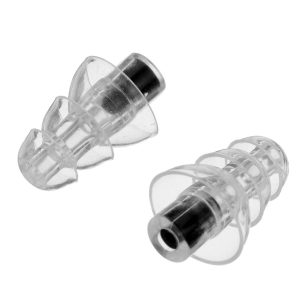
Depending on which ones you get, be careful with your headphones – some of them stick out a fair bit, and so you can end up getting an uncomfortable poke in the ear! They tend to be priced around £10-20, and the sound is acceptable with the ones I’ve used.
Other Tactics
Hearing loss is a funny thing – it can be an accumulation over time, or it can be brought on very suddenly by a single very loud event. Obviously, as DJs, we tend to be in very loud environments a lot.
One thing you might be able to do – if you are in a DJ booth with a proper monitor set-up, only turn the monitor up when you are actually using it (ie, cueing and mixing). Once you are done, turn it back down to zero. Then back up again for the next mix in a minute or two.
There’s a few benefits to this. Firstly, you are limiting your ears’ exposure to the very loudest music it will get. Secondly, it stops you getting too lost in your own little “booth party”, and forces you to think about what it sounds like on the dancefloor, around the venue, and pay more attention to your audience. Third – its likely that you won’t end up with the monitor creeping up and up and up and up! Ears tend to adjust to whatever volume is there, and so to get the same “impact” it is tempting to just keep turning things up, not realising that you are taking it too far. Monitor outputs almost never have an LED read-out to say you are going into the red, and it happens ALL THE TIME – DJs get carried away, and end up with the monitor as loud as it will go!
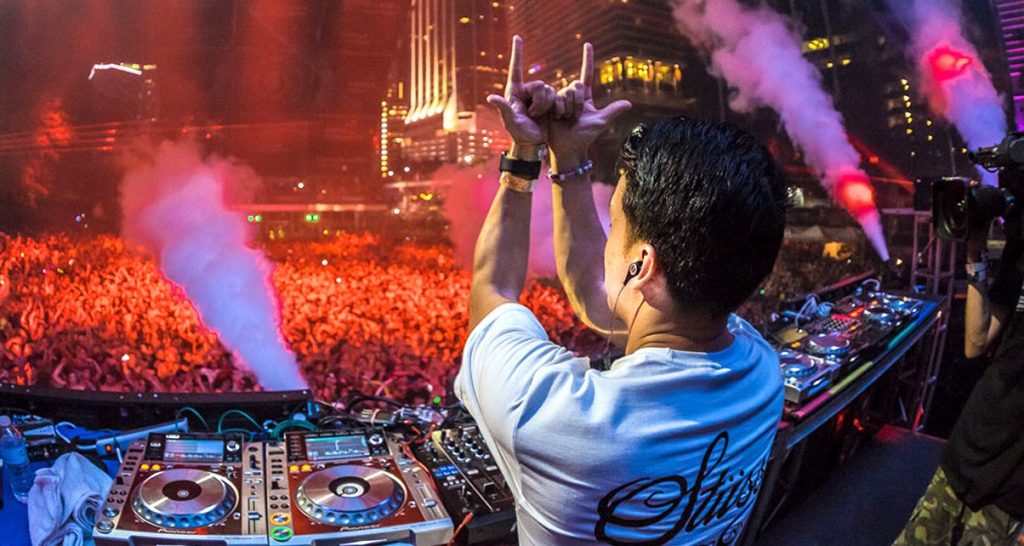
One clever approach that seems to be growing in popularity is in-ear monitoring. With this, people have small in-ear headphones instead of larger over-ear DJ headphones. You can get moulded ones made even, or just use traditional wired in-ear headphones. Then use the cue/master controls to mix, rather than the monitors. This gives the DJ a much more precise sound to work with. The downside many mention is that you can feel a bit disconnected from the audience. But really, once you turn the volume back down, its no more so than with moulded earplugs. It is certainly a tactic worth considering, and completely eliminates the all-too-common problem of bad monitoring setups, or even those situations with no monitor at all!
Hopefully this article will have sparked a few ideas about protecting your ears. In all seriousness – anything is better than nothing. Hearing loss is a horrible thing for anyone to suffer. It is preventable. We are in a business that totally depends on having functioning hearing.
So it is crazy that many DJs will drop a couple of hundred on a pair of flashy sneakers, and then quibble over spending half that on protecting the most important tool they have!
Look after your ears, and protect your hearing!
Get the latest tracks over at the Heavy Hits Pool, and follow me over on Instagram!

Tips for DJing in the open air!
Its the summer, and not only that, loads of clubs are closed indefinitely. So, an awful lot of DJs are having to DJ out in the open air. This can be amazing fun, and lead to some magic moments, but it also presents certain logistical challenges, for all sorts of reasons!
Here’s some practical tips to avoid coming a cropper!
Get some shade
If you can set the decks up in a way that you get some shade, that is a GREAT idea – and if there is no natural shade, a large parasol can be a huge help. There’s a few things at play here.

1 – Protecting yourself – you do NOT want to be getting sunburnt, you don’t want sunstroke – and this goes especially if you are DJing a long set, drinking a few drinks, and then risking get messy because of the heady mixture of sunshine and alcohol.
2 – Laptops and CDJs can have real problems in the bright sunshine. I did the main stage at GlobalGathering a few years ago, DJing in the changeovers between the acts. One of the earlier acts was relying on a laptop which was in direct sunlight for their set – towards the end of the set, it started to crash, as it was overheating! I have known this to happen with CDJs too – a total vibe killer!
3 – Even on their brightest setting, many CDJ displays and lights are almost impossible to see properly in direct, bright sunlight. Laptop screens can be tricky, but these LCD screens are a NIGHTMARE out in the sun. A bit of shade at least gives you a chance of reading your track library!
Stay hydrated – but keep those drinks away from the decks!
I mean – this one stands for pretty much any gig ever. But there’s obviously a practical point about staying well hydrated out in the sun, and then an observational point that drunk party people out in the open, be it by a pool or a beach or whatever, seem to be even more clumsy and unpredictable than people in clubs. A high bar to beat, sure, but in my experience it holds true.
Try to make sure that you keep your drinks on a table/surface away from all the electronics, and don’t let randoms try to put their drinks round your decks etc!
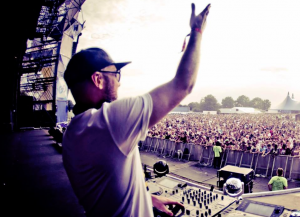
Sun Lotion!
If you are going to be out in the sun, get yourself lotioned up – but make sure you wash your hands before you get to the decks! Nobody wants skin cancer, and nobody wants weirdly sticky decks.
Sunglasses!
Sunglasses in the club are basically a great way of signalling to people that you are either an idiot, or high on drugs (and want to conceal your massive pupils). In the club, sunglasses are a big fat “NO”.
Out in the open? Yes! Get those stunners on. Rock your favourite shades. For a start, people just look cooler in sunglasses. That is a scientific fact. Also, you then have the advantage of people not seeing where your eyes have wandered – an occupational hazard at pool parties. The sun’s UV rays can damage your eyes as well as your skin, and it can sometimes get windy as well, so shades are a very practical addition to your set-up.
Be warned though! The problem of screens and displays being difficult to read can be exarcebated by dark-lensed sunglasses. Pick wisely!

Check your set-up for stability and safety!
One thing that holds true for most outdoor gigs – you tend to be DJing on a temporary stage/deckstand. A good venue should have something stable and secure, with any power points safely away from water, using safe electrical connections. But there WILL be times when this isn’t the case – when you are on a wobbly table, with all the equipment running through a multi-connector into a single electrical socket somewhere. Get there, check this stuff out, and do what you can to make sure your DJ booth is stable and safe!
This is where a little bit of judgement and responsibility comes in – if it looks genuinely looks unsafe, you need to raise this NOW. Its pretty unlikely that it actually be truly dangerous, but water + electrics = a bad time. You have a responsibility to yourself and the party-goers to make sure that this is all OK!
At smaller scale events it might be that you and the party organisers need to make sure that anyone who comes near the decks knows the score – if the table is wobbly or unstable, if there’s an electrical cable trailing across the floor etc, anyone coming close can be asked to be careful. Ideally, tape down loose cables so that people can’t trip on them. Because if they can, then people WILL trip on them! And don’t forget that there will be a big legal liability bill to go around if you accidentally electrocute 250 people in a swimming pool…
Watch out for rain!
I always recommend having a plastic keyboard cover, and personally I use a specific Serato one for my laptop (handily colour coded for shortcuts etc). In the club, this is mainly for if drinks get spilled or knocked around the booth, and has saved my laptop many, many times. The Serato-specific ones can be a little pricey, whereas the plain ones are very cheap.

But out in the open – rain is an ever-present threat. And lord knows, I have had some bad luck with this. I DJ’d in Doha, Qatar, at an open-air beach club run by Hilton Hotels. I turned up, and about 15 minutes before my set, it started raining – the only rain they had encountered in months! So, I had to do most of the set with a tarpaulin pulled over the Pioneer Nexus set up, and a plastic bag over my laptop! Unsurprisingly, I DJ’d to a very, very small crowd.
But if it can rain on me in a country that is largely desert, it can rain on you wherever you are – make sure that you are ready to act fast if that happens! Always have a contingency plan, and if you can, practice how it will work ahead of time – no point thinking you have a plan, then realising that it doesn’t work in the heat of the moment!
Think about the time you are on
One of the great things about DJing out in the open are the transitional moments – the obvious one being sunset. There’s something magical about when the sky turns into a blaze of reds, pinks and purples, and this brief, passing time can be a defining moment in an open-air set, when you take people from day-time into night-time, and switch the mood up. If you have got a sundown set (or indeed a sunrise one!), think about songs that might be able to capture the beauty of the visuals, give people a transcendent experience that will be their abiding memory of the party! Often it is something that you can only prepare for to a certain point – this is where reading a crowd, reading a vibe, come in, where knowing your music collection pays off!
Get this right, and you will be the DJ everyone is talking about the next day!
I’m sure there are things that I have left out here, but I hope this has given you some practical tips and ideas for these open-air sets! Go and build up that music collection at a different kind of pool, and follow me over on Instagram!

Diggin’ In The Crates
One of the most important skills that any DJ can develop is the ability to work out what is hot, and what is not. There’s a tightrope to be walked between playing things that you can safely rely on to move a crowd, and playing things that differentiate you from the other DJs out there.
Here’s a few ways to keep your crates that perfect mix of crowd-pleasing and individualised!
Heavy Hits curated playlists
Given the website we are on, I can’t ignore the brilliant custom playlists available over in the pool. You can search by keywords, genre tags, category and more – and pretty much every genre and era you could think of is covered, selected by an expert in that field. There’s a great mix of crowd-pleasers and overlooked classics to choose from. We all also have associated Spotify/Apple playlists for some of these, so you have multiple ways of checking these tunes out!
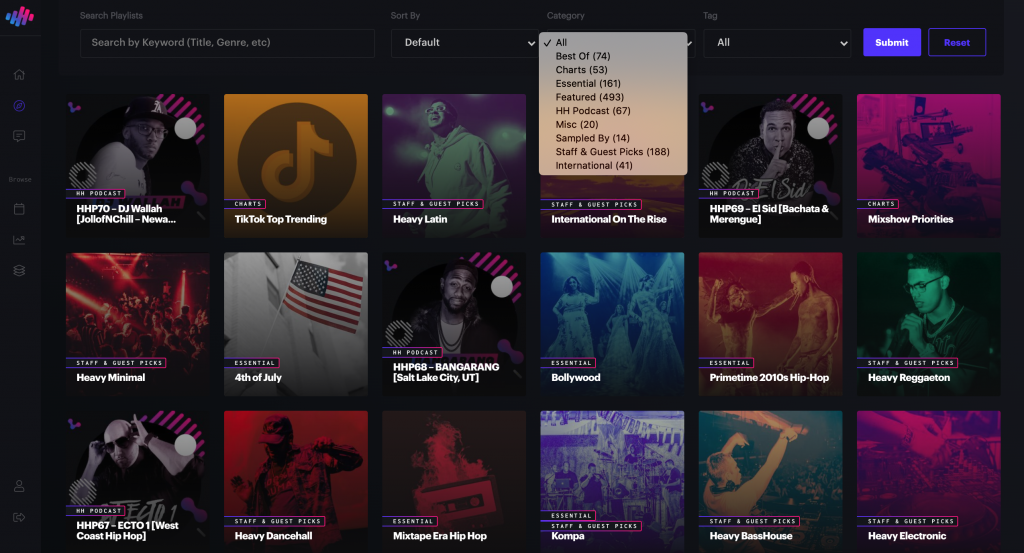
As well as the playlists, you also have the charts to look into, where you can break things down by different time spans – the most recent 7, 30, 90 and 365 days, so you can either have the most popular recent things, or stuff that has been big over the last year.
Tik Tok Trending Tunes
As you can see above, Heavy Hits has Tik Tok Top Trending playlists that it puts out. And in the music landscape of 2020, where almost no clubs or festivals are happening to keep an eye on dancefloor trends, Tik Tok is one of the quickest ways to find out what songs are familiar and popular, especially with younger listeners.
Chartmetric has recently started keeping a chart to show the weekly changes in songs’ popularity on the popular social media platform. There are some fascinating metrics included, and if you are looking to spot trends as they emerge on Tik Tok, its a very useful source of information.
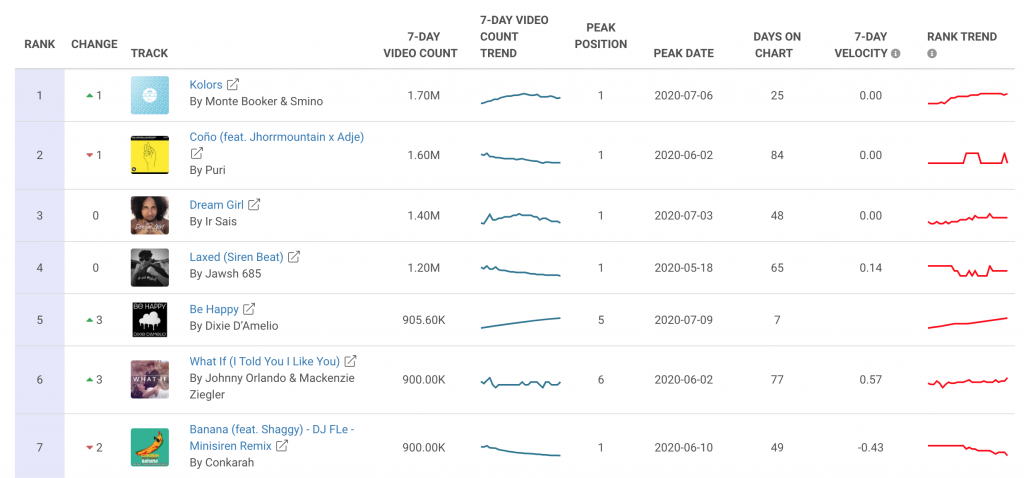
Spotify playlists
One of the best life-hack DJ tricks I’ve learnt in recent years is using Spotify playlists to dig into specific styles. Even in genres you know really well, this can be a great way to learn about tracks and artists you had missed. It is incredibly simple; create a playlist, name it something reasonably descriptive (eg, “90s R&B” or “Songs about money”). If you want, enter some info into the playlist description with useful keywords for the algorithm to use. Even just 5 tunes is enough to give Spotify a decent idea, then it will suggest tunes. The more you add to the playlist, the better an idea of what you want it has.
A friend set one up for background music at an event, wanting songs about money, and it worked it out straight away, giving him dozens of options he never would have thought of otherwise!
If you get booked for a function and they want you to include a genre that you don’t know a lot about, this is an amazing shortcut – just get the client to give you half a dozen suitable songs, and then let Spotify do the digging on your behalf, and pick the ones that you think work!
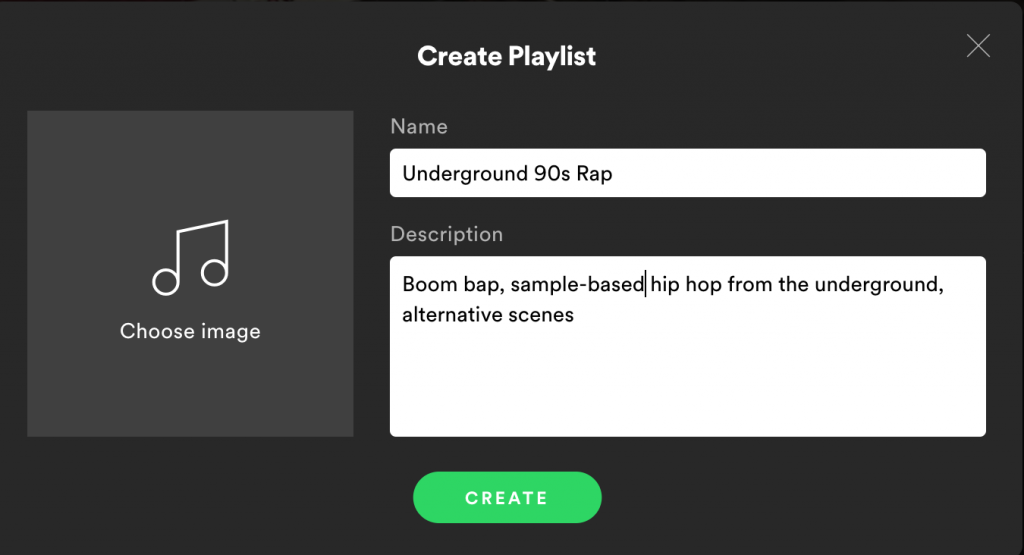
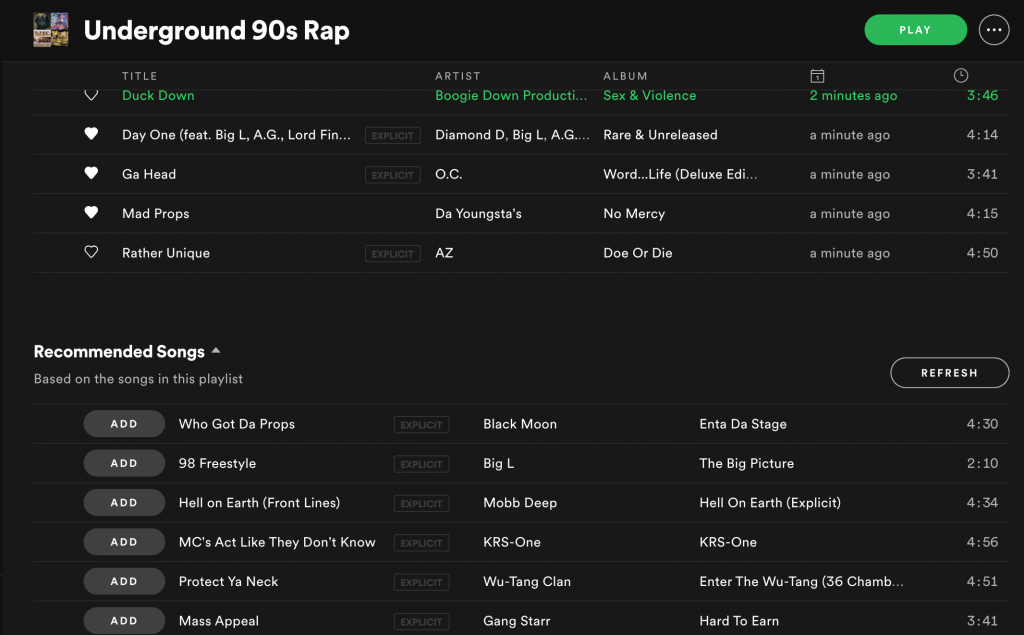
It is also worth keeping an eye on the charts on streaming platforms, which can usually be viewed for different territories, or globally. And the big curated playlists have a huge influence on what songs blow up in the mainstream.
Radio Station playlists
It has long been the case that radio drives a lot of what the public ends up enjoying, and a great shortcut for following this (if you haven’t got the time to listen to a bunch of different stations) is to regularly check out their playlist pages. Hot 97 has their New AF! page, which is also available simply as a Spotify playlist. The BBC break their radio playlist down into A list, B list and C list, and from this page you can check their more specialist stations as well from the links at the bottom. The BBC’s main music radio rival, Capital FM, is here.
Depending on where you are and what music you play, its very likely you can Google the top stations’ playlists for pages much like the above!
Shazam
Times have come a long way since I started DJing in the mid 90s – if I heard a song on the radio but missed the announcement of who it was by or what it was called, I was stuffed. Same in the club – if I didn’t go and ask the DJ, or if the DJ didn’t feel like telling me, I could leave a club wondering if I’d ever hear that song again.
Now you can grab your smartphone, fire up Shazam, and within seconds it usually tells you the song, artist, adds it to your Shazam library, maybe sends it to your linked Spotify playlist… its crazy!
And of course, Shazam can keep charts of what is being Shazammed! If millions of people are getting their phones out to find out the name of a song, you can guess that it is proving popular. This can lead to some interesting revivals of old songs, which have been in an advert, film or TV show!
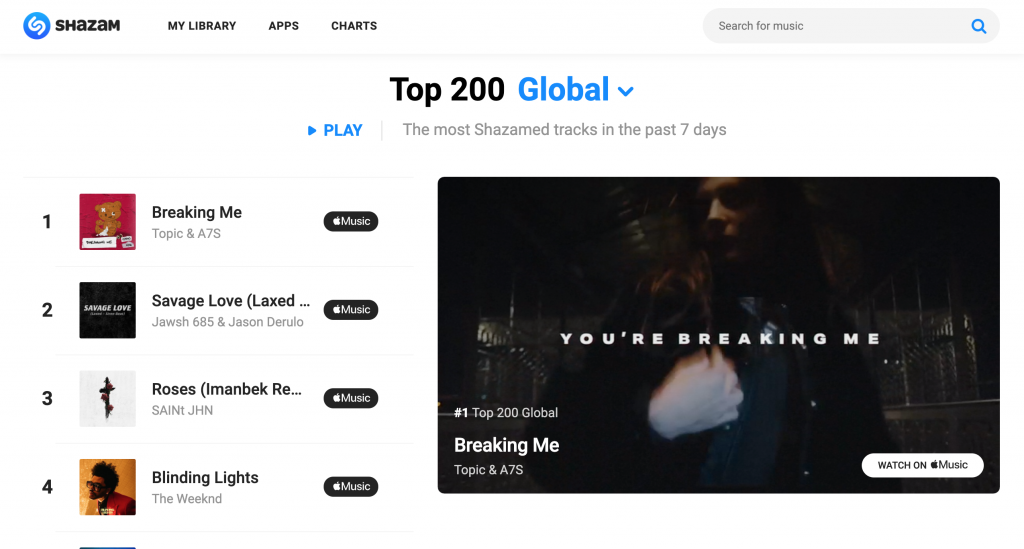
Listen to mixes by DJs you respect
This one might seem crashingly obvious, but its surprising how many DJs forget to listen to other DJ mixes. A friend put it very well – “A DJ not listening to other DJ’s mixes is like a writer not reading other writer’s books”.
There’s a whole host of reasons to listen to other DJs mixes, and at the heart of those reasons is the discovery of songs, and hearing how songs might work in ways that you didn’t realise they would. There’s plenty of songs that I’ve written off as not suitable for playing out, and then when I see a DJ use them in a club, or hear them in a mix, I realise how wrong I was!
Most DJs include a tracklisting these days, and even when they don’t – there’s always Shazam!
Go on a Youtube journey!
This is a fun one – kind of unpredictable, but it has taken me to some weird and wonderful places at times! Basically, its a bit like the Spotify playlists one, but a bit more random (in my experience anyway!).
When I do this, it tends to be after seeing a tweet from the Paradise Garage Bot that has caught my eye. I head over to Youtube to check it out, and then sometimes just let it play, or select something from the suggested videos. I regularly discover complete obscurities this way. Once I ended up discovering a whole sub-genre of Turkish disco edits that I had no idea existed, but that was full of incredible stuff. I haven’t really understood exactly how this one works, but I enjoy following my nose around there and seeing what I stumble across! There’s always a few suggestions that I don’t recognise, and within a few clicks you can be in totally uncharted territory!
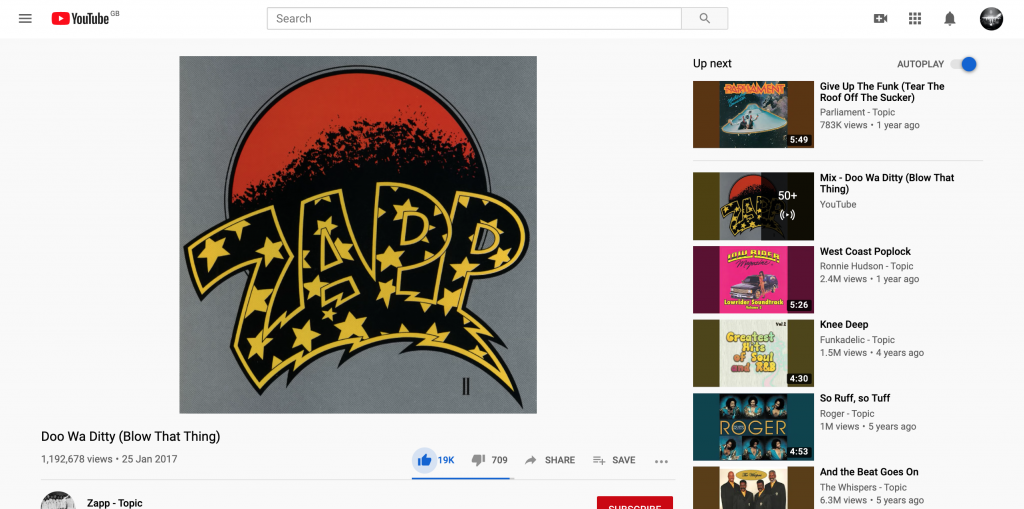
Bandcamp
This is easily my favourite music store on the internet, and a great source for underground and alternative music. They also have a simply brilliant function – you can follow other users, and receive notifications about what they buy. I follow a bunch of my favourite DJs, some friends, random people who seem to have good taste, and discover all sorts of great music this way. My collection that I’ve bought can be viewed here.
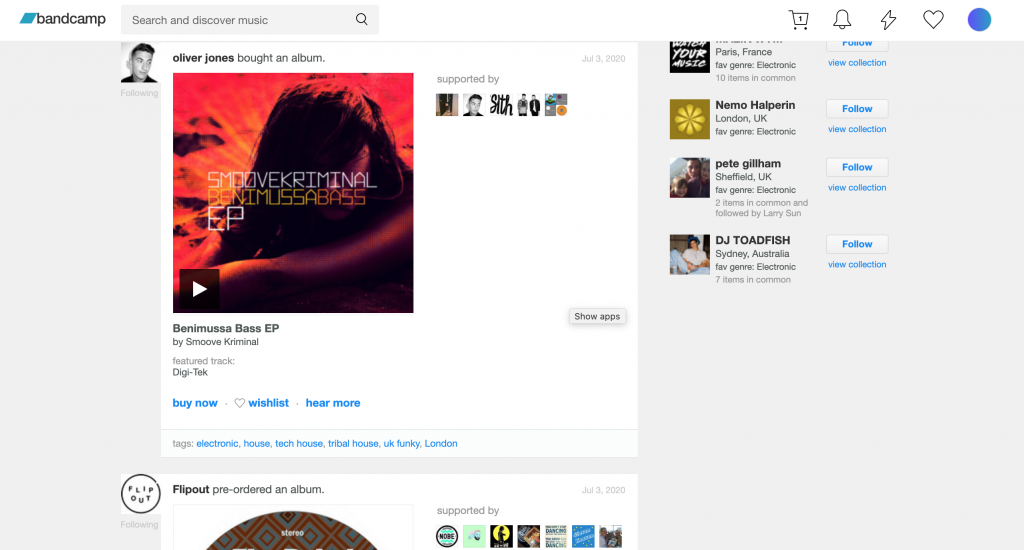
Soundcloud
To be honest, I don’t use Soundcloud the way I used to in its heyday, but it still has a crazy amount of edits, remixes and bootlegs on there for free download – if you can be bothered to spend a few hours on there, you can find some really high quality stuff!
Often, tracks will require you to follow the artist on Soundcloud and/or Instagram in order to download the tracks you want, which is a small price to pay. And this will sometimes take you to this handy site – Hypeddit – where you can quickly skim through other tracks you might wish to download.
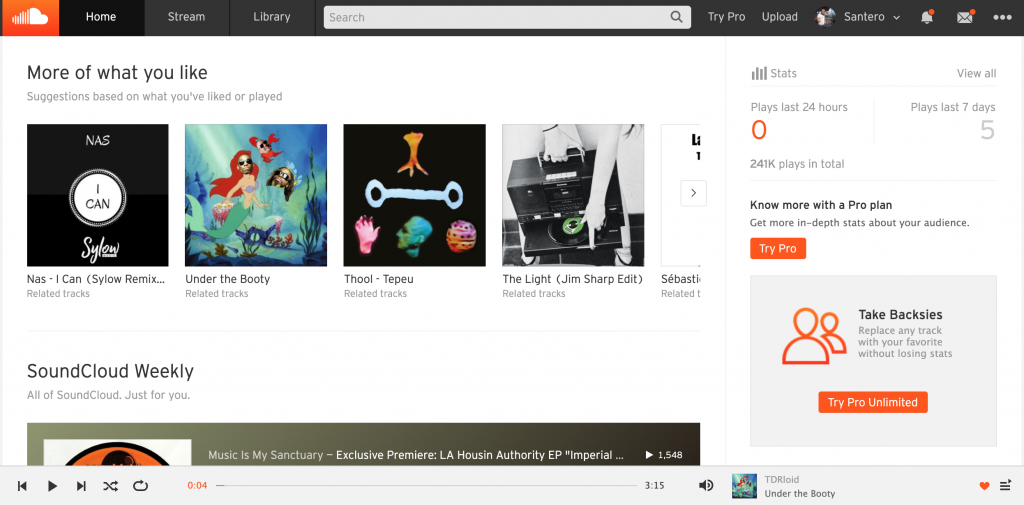
So as you can see – there’s a whole host of ways to stay on top of what is popular, and to search for things that will differentiate you from the next DJ.
I hope this helps you stay on top of the current trends, and dig a little deeper for the curveballs in your sets!
Follow me on Instagram
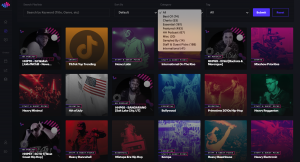
The Dos and Don’ts of DJ Changeovers
All DJs have their ideas about their ideal sets, and those fantasy moments where it all comes together for pure magic; hundreds, maybe thousands of people united in a moment of euphoria and togetherness. Hands in the air, a seething mass of happy humanity.
But there are also more practical concerns that it pays to be good at – and one of the simplest of these is the art of the changeover. It might not seem like much, and in many ways it is one of those things that if you do it right, it goes almost unnoticed. But do it badly, and it can really, really reflect badly on you. And that does not help you get to the magic moments!
So I’m going to talk through a few common issues, warn of some pitfalls many fall down, and share a few stories from my time behind the decks!
DO BE FRIENDLY
This might seem crashingly obvious, but it is amazing how often egos or nervousness get in the way of this one. Trying to be too cool for school, or maybe being insecure about your status next to the other DJs. Seriously – a happy smile, a friendly greeting, and some kind words (“awesome set!”, “have a good one, this is a great crowd!”) can go a long way to helping the party along. And ultimately, we are all there to serve the party!
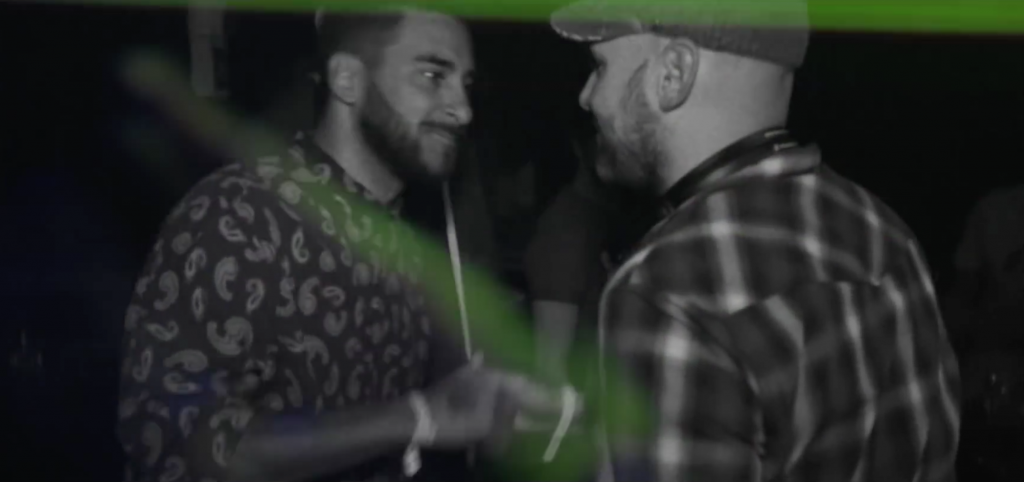
DO GET THERE IN PLENTY OF TIME
There’s a bunch of reasons for this one. For a start, if you budget to get there 5 minutes before your set and then get held up, then you are in trouble! Also, at big clubs it can take surprisingly long to get from street to booth. Really, you want to be there in enough time to meet the promoters/booker that is employing you, take a walk around the club to see what it looks and sounds like and get a sense of the crowd, and to be able to hear what the DJ before you is playing. The amount of times I have handed the decks over to someone, and then within their first 2 or 3 songs they play something I played 10 minutes ago… Oh dear! And if you are the first DJ on, you don’t want the club having to wait for you before they open their doors, and getting there early is a good chance to chat to the staff.
DO TALK TO THE OTHER DJs
Another reason to get there early – you can chat with the previous DJ about how to do the changeover. You might have preferences for this, and they might have preferences for this, and there’s no guarantee that they are exactly the same. If you are dealing with a big name DJ that is higher on the bill than you, it is sensible to defer to their preferences. But it is worth asking them if you are following – some will want you to let their last song play out, some will be happy for you to mix straight in, and you never know, this sometimes can lead to impromptu B2Bs! And the same applies if you have been warming up – they might have a big showbiz intro they want to do, they might want to encourage some applause for you, or they might prefer a seamless mix into their set. Be prepared for any of these possibilities! It shouldn’t really need saying – don’t play the headliner’s tracks in your warm up, unless they have expressly said that it is OK to do so! But generally, to even ask the question is seen as a faux pas by most people!
If they are following you, maybe offer them the chance to look at your play history to avoid doubling on tracks. And if following someone, you can ask them for the same, to avoid looking silly yourself, or ju get there in enough time that this isn’t a worry.
If you are the headline DJ on a line-up, communicate your preferences to the promoter and residents, but try to avoid seeming pushy or arrogant. If you are the smaller DJ, do your best to to find out what the headliner would like from a warm up set. On the night, simple questions like “Is there any tempo you want me to finish on” and so on communicate to them that you are there to set them up as best you can. They will really appreciate this thoughtfulness.
DO THINK ABOUT TECH SET-UP
If you are on USB, it is generally a pretty straightforward process to swap over. But once laptops and Serato get involved, it can get more complicated. Fake Blood used to joke about the “15 minutes of confusion” trying to change DJ booths round, and when your focus is on that, it is very easy to lose sight of the party. If you have to use a Serato box or similar, try to get that set up by a sound tech if it is a possibility, and if that can be done at the start of the night, even better. Pulling the wrong cables out in the middle of a busy night is without doubt the stuff of anxiety nightmares. If you are on Serato, seriously considered purchasing their club kit plugin. It means that you can plug directly into the USB port of a whole range of mixers, including most industry standard club installation mixers such as the Pioneer DJM900. This saves SO MUCH hassle.
I once had to take over from a DJ at a gig in Sheffield, not long after I had been in the world final of Red Bull 3style. The warm-up DJ had another gig to get to, so I had to swap from his Serato box to mine. We were high up on a stage, in front of a huge crowd. Somehow in the changeover, my box got knocked. I watched it, seemingly in slow motion, topple from the stage. All cables disconnected at once, and the unit smashed into the club floor below. TOTAL silence, and about 800 people suddenly staring right at us! Brilliantly, we were using vinyl for Serato that night, so the option of just quickly switching to a track on USB wasn’t there. While he ran off the stage to rescue my Serato box (which miraculously hadn’t been killed by the fall), I plugged a deck in, and chucked a record on to break the silence – only then realising that the emergency record I’d pulled out had no markings to say which was the A or B side. Thankfully I guessed right, and New Order – Blue Monday drew big cheers from the crowd, and we just about got away with it… But I learned a lot of valuable lessons that night!
DO FINISH AT THE APPROPRIATE TIME
I’ve seen this one more times than I care to remember. These days, 1 hour slots are very common, so as to stack a line-up with DJs. But then, at 11.59 and 45 seconds, the DJ that finishes at midnight mixes in Mo Money Mo Problems, and you are left in the weird situation of either mixing out before the Biggie verse, or losing 5 minutes of an already short set! So – DON’T BE THAT GUY! Stay in communication with the DJ following you – “OK, gonna do two more, you good to go then?” – it is always possible that they might need you to play a little beyond the exact time. Be ready to finish on the dot, and also be ready to continue on for a little if their set-up is taking longer than expected.

DO MAKE SURE THE NEXT DJ KNOWS HOW YOU LEFT THE MIXER
I tend to mix using both the crossfader, and the channel faders. I have learnt over the years that a LOT of DJs prefer to just use the channel faders, and to leave the crossfader switched off. All too often I have forgotten to relay this information to them, they’ve tried to mix in, and panicked as time ran out, and the new track isn’t coming through the system. Now, I always try to check – “Do you want the crossfader on or off?” – and also leave the EQ and gain pots at 12 o’clock as well.
DO MAKE SURE YOUR PEOPLE BEHAVE
It is very common for DJs to roll with a bit of a crew – partner, friends, maybe agent or manager if you are at a certain level. Most times, they will expect to be in the booth with you. Its crucial that they understand the etiquette you are following – having your mate start messing with the faders while a headline DJ is trying to get his set started is not a good look!
DON’T HARASS THEM WHEN THEY ARE STILL PLAYING
If you want to get a pic with the headliner, or exchange contact details or whatever, there are better times to do this than during someone else’s actual set. In the green room/backstage early or late on, or during your set, where you can manufacture a bit of time and space to do this. All DJs know the frustration of the punter who doesn’t get that you are at work while on the decks, and won’t leave them alone – the last thing you want to do is create the impression that you, a fellow DJ, don’t understand this!
DON’T LEAVE THE DJ BOOTH IN A TOTAL MESS
There are few things less pleasant than taking over the decks and there’s empty glasses everywhere, no clean surfaces to set a bag down, rubbish all over the floor, drinks spilled all over the equipment, and so on. Keep the booth how you’d hope to find it, and make sure to tidy your stuff away when the next DJ arrives, and definitely make sure there is room for any bags or flightcases they have with them.
Much of this comes down to communication.
Try not to be intimidated by the headline DJ, even if you are a big fan – if they’ve travelled to be there, they are looking for friendly faces. Strike up a good rapport and then the next time in town, you’re that great warm-up DJ they got on with so well before. A lot of friendships in DJing start this way, and it can really open doors over time!
If you are the resident, in some ways you are the face of the night to guest DJs – that is a real responsibility, and the promoters and clubs genuinely value residents who take this side of it seriously, and act accordingly.
If you are a guest DJ, or even the headliner, making it clear what you would like in a way that isn’t condescending or mean is just common sense. I have heard so many 2nd or 3rd hand tales of “Oh, such and such a DJ is a total idiot, they were really rude to everyone” – often based on the only time they met the DJ in question. People love a bit of gossip, and a lot of insecure DJs will use any opportunity to trash talk about someone higher up the ladder than them.
So, even if you are jet-lagged and tired, try your best to be polite and friendly, or you risk picking up a reputation – and people would rather book DJs that are easy to work with! Clarity ahead of time (and arriving in plenty of time at events to make sure things are the way you want) will iron out a lot of the issues you might run into.
Ultimately – the more professional you are, the more that people will treat you like a pro, whether you are just starting out, or are at the top of the game.
For now, keep building your skills, and pick up the best new tunes at the Heavy Hits pool. Follow me on Instagram!
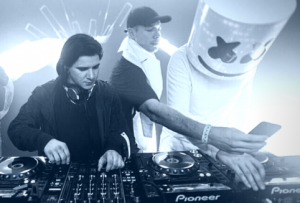
Keeping Your Head Together
One of the most difficult challenges in a situation as unusual as this is keeping your head together. I’ve had some challenging days and weeks in the last couple of months, and I know I’m not alone in that.
DJs are in a particularly difficult set of circumstances at the moment, but there are ways I have found that help me stay in the right frame of mind. I still have ups and downs, but the framework I have gives me something to fall back on when I start slipping, and I can tweak it as I go along.
The key aspects for me are 1. ) Habits and 2.) Journals
Habits
I try to start my day with a habits routine that sets me up well. I use a great app called HabitBull to track a whole bunch of activities – I’m a huge advocate for the power of habit in changing the quality of your outcomes. Once you do something regularly enough, it becomes basically automatic, and you’re doing a positive thing without even having to think about it. My key things first thing in the morning – out of bed at alarm, make bed, 25 press ups (to wake body up), meditate, journal, Duolingo classes (usually do these last 2 over breakfast). Then I will head out for my morning run.
The great thing about a habits tracker (where you tick a box each time you complete the habit) is that it keeps you honest – if you aren’t tracking, its easy to go a week or so without doing something, and before you know it, the habit has completely slipped. When you get 2 or 3 days without a tick in the box on your app, you know that you need to do it today! If you are anything like me, your competitive urge will motivate you to keep a good run going, and to maintain a certain percentage of habits completed (I feel like 80%+ is decent going, at the moment I’m at 83%). Don’t beat yourself up if you have a bad day, just use it as motivation to do all your habits the next day.
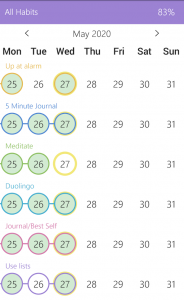
You’ll find that the simple satisfaction of a full set at the end of the day is very good for your self-regard. And by setting up the right habits, you can get your day started with a bunch of simple things that are good for your wellbeing. For the competitive amongst you, you can set up with Habit Share and compete against a friend – thanks to this, I haven’t eaten any candy in all of 2020, amongst other things. The competitive element has massively helped me here!
If you want to know more about habits, there’s two books I highly recommend – The Power of Habit, and Atomic Habits.
Journaling
This is something I struggled to do regularly at first, but now is an integral part of my daily routine. I actually go a bit overboard, maybe – I probably don’t need to use all these methods!
I use an app called 5 Minute Journal – this is super simple, and means that even if I don’t have time to use paper journals, I’ve given the day some thought here.
Then I use a journal planner called Best Self – though there are many similar journals. The way this one works is that you have up to 3 x 13 week overall goals. You map out why you want to do these, what this will achieve, and most importantly, how you will achieve them. Then there are 13 separate weekly planners, and finally, a diary where you can plan our your days down to the hour, with space for your daily aims and accomplishments etc. I find this incredibly useful in keeping me focused on a specific goals – I tend towards getting easily distracted by whatever comes along, and losing focus, and being able to refer back to this journal keeps me on track. On the day, and in general. Seriously – my brain is extremely scattershot at times, to the point where my girlfriend suspects I have ADHD! But this book allows me to regroup and get back to what matters, rather than following whatever distracting thing came along!
I plan my day in the morning, and review it at the end of the day, list my wins etc. It is fundamentally about productivity, through better planning – I’ve found it much easier to stay focused and get things done since using these.
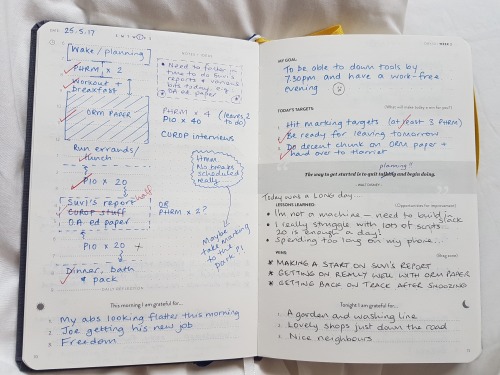
Finally, I just use a normal notepad to journal my general thoughts, feelings, plans, observations – this one is much more about staying on top of my mental and emotional health. Again, I use this morning and night. In the morning I write down the date, time I got up, and score my mood out of 10. Then I talk a bit about my plans for the day, how I’m feeling. At night, I reflect on the day just gone, the important things that happened, congratulate myself when I deserve, examine the times I let myself down, etc, etc. This kind of journaling is a bit more about exploring why I want to do things, why I feel certain ways about how things went, what it all means. With this, it is very important to be completely honest with yourself – in many ways, if you use this right, its a bit like a form of therapy. You get to explore your thoughts and feelings about things. Having a way to express them privately, and explore what you really think about the circumstances we are in, is a very useful tool to have in your kit. I hang on to these journals (Best Selfs I chuck after I’ve used them) – they are a fascinating window into where my head was at different points in my life, and its interesting to be able to refer back to how I felt about specific moments. Often its not at all the same as how my memory remembers things – the brain is strange like that!
Another thing – give yourself some breaks!
For the first month or so of this crisis, I forgot to give myself any days off. Normally, with gigs, I would treat Monday/Tuesday as my weekend, and have a bit of “me time” then. With the lockdown, I was trying to work a Mon-Fri office day, but then streaming at the weekends as well, which meant lots of prep in the days. I was getting really stressed and up tight, then there was a moment when I realised I had been putting myself under more work pressure than I ever was in normal times. I was saying yes to every opportunity to do a mix or an interview or whatever, which was making it harder for me to do any of these things properly, and impacting my ability to do my own projects right
Once I recognised this, I made it a goal in my Best Self planner to do absolutely nothing on certain days other than my morning habits – I just hit the sofa and watch movies all day long! And on your work days, schedule in gaps here and there to go for a coffee, a walk, play a game on the console, etc etc. All work and no play makes Jack a dull boy! And I’ve had to make some tough choices about which projects I have the time and energy to do – its better to do one or two things well, then 5 or 6 badly! On this topic, I highly recommend this book on Essentialism – the disciplined pursuit of less.
Conclusion
What I’ve written is just a loose outline of what I’ve found that works pretty well for me. Others might not like, or need, that amount of routine. I find that without it, I get nothing done, at all, and that makes me feel terrible, which drains me of motivation, so even less gets done.
When I start slipping, I know that if I religiously tick off all my HabitBull habits (which in total is maybe an hour or two of my day, maximum) then I will feel a LOT better about myself, which I find makes everything else flow. It sometimes takes me a few days to get myself back together, especially at the moment, with so much uncertainty about the future. And that is fine – this situation is not easy, for anyone!
One great thing about journaling and habit lists is that they serve as a really simple early warning system – if I get lazy with my habits or journaling, its a good sign that something is up. Stopping doing these things tells me something is wrong – and starting doing them again goes a way towards pushing me back to a better state of mind. Meditation is a big help here (I use the Waking Up app) – it trains you to be able to note and observe your experiences and feelings as you have them, rather than getting caught up in them. So you eventually become better at seeing when you are going in bad mental directions, which gives you a chance to correct course.
Be kind to yourself, as you would be kind to a friend going through a tough time. If I’m struggling to get back into the groove, a useful trick I find is to make a to-do list, and have a bunch of really easy wins at the beginning, just to get the ball rolling, and work up to the harder, longer tasks. The main thing is just to feel like I achieved what I set out to, and allow a positive mindset to build up.
But don’t beat yourself up if you struggle to get anything much done. This is a really stressful time for everyone in the DJ community, and getting through it in one piece is a win. Anything else above and beyond that is a bonus. Don’t measure yourself based on what you think others are doing.
It has been a common thing to say “we’re all in the same boat” – the truth is that we aren’t, we’re all in the same storm, in very different boats. And in a storm, you will get some crazy ups and downs – the crucial thing is to not get carried away when you are up high and can see the horizon, and not take it too hard when the lows come along and you feel like you can’t see a way out. This will pass, and we will party together again.
In the meantime, do what you can to stay well, try to build your skills, and keep on developing your music library over at Heavy Hits pool!
Follow me over at Instagram.

